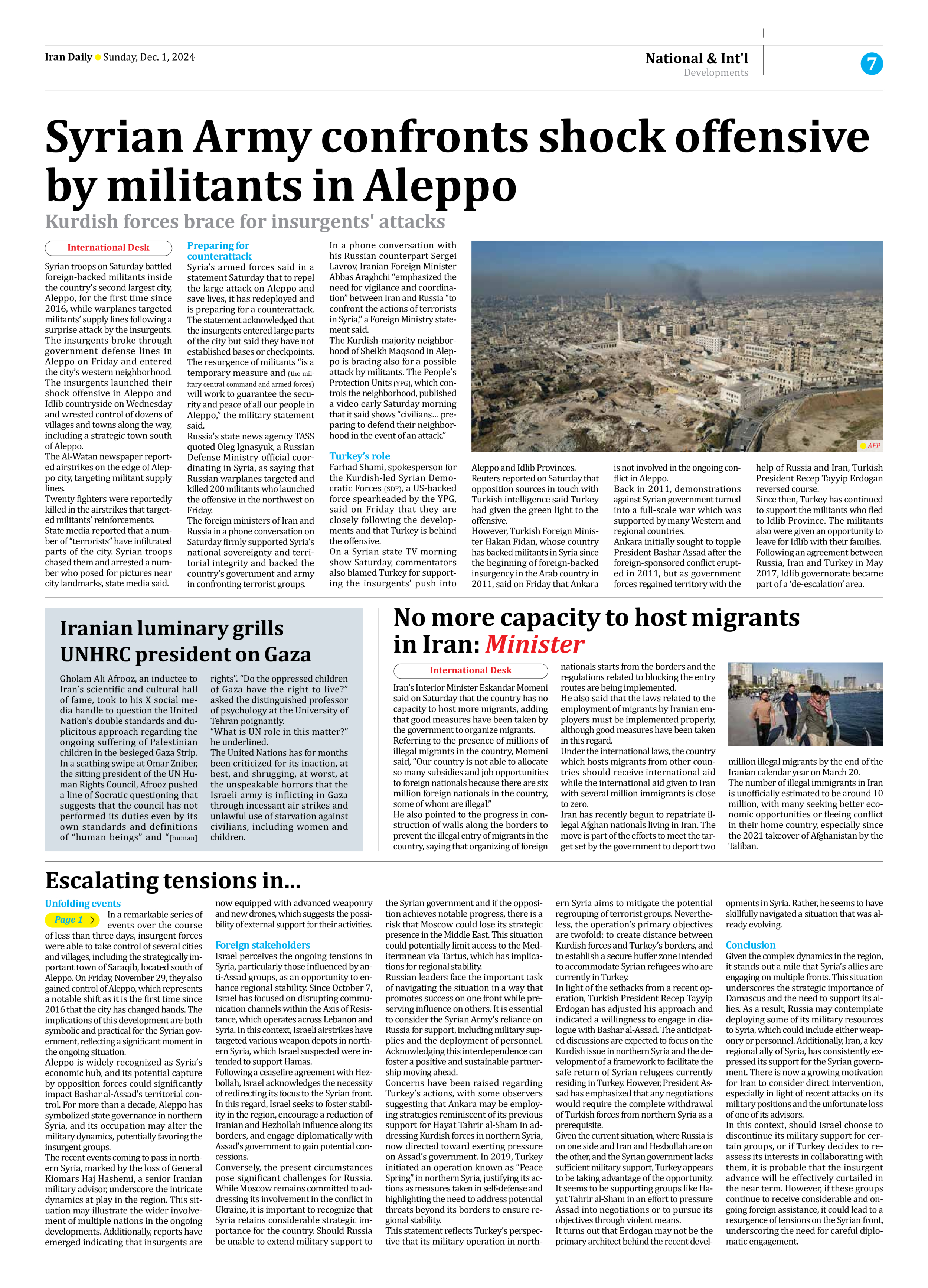
Escalating tensions in...
Page 1
Unfolding events
In a remarkable series of events over the course of less than three days, insurgent forces were able to take control of several cities and villages, including the strategically important town of Saraqib, located south of Aleppo. On Friday, November 29, they also gained control of Aleppo, which represents a notable shift as it is the first time since 2016 that the city has changed hands. The implications of this development are both symbolic and practical for the Syrian government, reflecting a significant moment in the ongoing situation.
Aleppo is widely recognized as Syria’s economic hub, and its potential capture by opposition forces could significantly impact Bashar al-Assad’s territorial control. For more than a decade, Aleppo has symbolized state governance in northern Syria, and its occupation may alter the military dynamics, potentially favoring the insurgent groups.
The recent events coming to pass in northern Syria, marked by the loss of General Kiomars Haj Hashemi, a senior Iranian military advisor, underscore the intricate dynamics at play in the region. This situation may illustrate the wider involvement of multiple nations in the ongoing developments. Additionally, reports have emerged indicating that insurgents are now equipped with advanced weaponry and new drones, which suggests the possibility of external support for their activities.
Foreign stakeholders
Israel perceives the ongoing tensions in Syria, particularly those influenced by anti-Assad groups, as an opportunity to enhance regional stability. Since October 7, Israel has focused on disrupting communication channels within the Axis of Resistance, which operates across Lebanon and Syria. In this context, Israeli airstrikes have targeted various weapon depots in northern Syria, which Israel suspected were intended to support Hamas.
Following a ceasefire agreement with Hezbollah, Israel acknowledges the necessity of redirecting its focus to the Syrian front. In this regard, Israel seeks to foster stability in the region, encourage a reduction of Iranian and Hezbollah influence along its borders, and engage diplomatically with Assad’s government to gain potential concessions.
Conversely, the present circumstances pose significant challenges for Russia. While Moscow remains committed to addressing its involvement in the conflict in Ukraine, it is important to recognize that Syria retains considerable strategic importance for the country. Should Russia be unable to extend military support to the Syrian government and if the opposition achieves notable progress, there is a risk that Moscow could lose its strategic presence in the Middle East. This situation could potentially limit access to the Mediterranean via Tartus, which has implications for regional stability.
Russian leaders face the important task of navigating the situation in a way that promotes success on one front while preserving influence on others. It is essential to consider the Syrian Army’s reliance on Russia for support, including military supplies and the deployment of personnel. Acknowledging this interdependence can foster a positive and sustainable partnership moving ahead.
Concerns have been raised regarding Turkey’s actions, with some observers suggesting that Ankara may be employing strategies reminiscent of its previous support for Hayat Tahrir al-Sham in addressing Kurdish forces in northern Syria, now directed toward exerting pressure on Assad’s government. In 2019, Turkey initiated an operation known as “Peace Spring” in northern Syria, justifying its actions as measures taken in self-defense and highlighting the need to address potential threats beyond its borders to ensure regional stability.
This statement reflects Turkey’s perspective that its military operation in northern Syria aims to mitigate the potential regrouping of terrorist groups. Nevertheless, the operation’s primary objectives are twofold: to create distance between Kurdish forces and Turkey’s borders, and to establish a secure buffer zone intended to accommodate Syrian refugees who are currently in Turkey.
In light of the setbacks from a recent operation, Turkish President Recep Tayyip Erdogan has adjusted his approach and indicated a willingness to engage in dialogue with Bashar al-Assad. The anticipated discussions are expected to focus on the Kurdish issue in northern Syria and the development of a framework to facilitate the safe return of Syrian refugees currently residing in Turkey. However, President Assad has emphasized that any negotiations would require the complete withdrawal of Turkish forces from northern Syria as a prerequisite.
Given the current situation, where Russia is on one side and Iran and Hezbollah are on the other, and the Syrian government lacks sufficient military support, Turkey appears to be taking advantage of the opportunity. It seems to be supporting groups like Hayat Tahrir al-Sham in an effort to pressure Assad into negotiations or to pursue its objectives through violent means.
It turns out that Erdogan may not be the primary architect behind the recent developments in Syria. Rather, he seems to have skillfully navigated a situation that was already evolving.
Conclusion
Given the complex dynamics in the region, it stands out a mile that Syria’s allies are engaging on multiple fronts. This situation underscores the strategic importance of Damascus and the need to support its allies. As a result, Russia may contemplate deploying some of its military resources to Syria, which could include either weaponry or personnel. Additionally, Iran, a key regional ally of Syria, has consistently expressed its support for the Syrian government. There is now a growing motivation for Iran to consider direct intervention, especially in light of recent attacks on its military positions and the unfortunate loss of one of its advisors.
In this context, should Israel choose to discontinue its military support for certain groups, or if Turkey decides to reassess its interests in collaborating with them, it is probable that the insurgent advance will be effectively curtailed in the near term. However, if these groups continue to receive considerable and ongoing foreign assistance, it could lead to a resurgence of tensions on the Syrian front, underscoring the need for careful diplomatic engagement.







